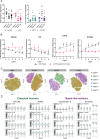Analysis of an engineered organoid model of pancreatic cancer identifies hypoxia as a contributing factor in determining transcriptional subtypes
- PMID: 40604231
- PMCID: PMC12223171
- DOI: 10.1038/s41598-025-98344-x
Analysis of an engineered organoid model of pancreatic cancer identifies hypoxia as a contributing factor in determining transcriptional subtypes
Erratum in
-
Correction: Analysis of an engineered organoid model of pancreatic cancer identifies hypoxia as a contributing factor in determining transcriptional subtypes.Sci Rep. 2025 Sep 9;15(1):32397. doi: 10.1038/s41598-025-18193-6. Sci Rep. 2025. PMID: 40925910 Free PMC article. No abstract available.
Abstract
Pancreatic ductal adenocarcinoma (PDAC) is a high-mortality cancer characterized by its aggressive, treatment-resistant phenotype and a complex tumour microenvironment (TME) featuring significant hypoxia. Bulk transcriptomic analysis has identified the "classical" and "basal-like" transcriptional subtypes which have prognostic value; however, it is not well-established how microenvironmental heterogeneity contributes to these transcriptional signatures. Here, we exploited the TRACER platform to perform single cell transcriptome analysis of organoids at specific spatial locations to explore the effect of oxygen and other cell-generated microenvironmental gradients on organoid heterogeneity. We found that the microenvironmental gradients present in TRACER significantly impact the distribution of organoid transcriptional phenotypes and the enrichment of gene sets linked to cancer progression and treatment resistance. More significantly, we found that microenvironmental gradients, predominantly oxygen, drive changes in the expression of classical and basal-like transcriptional subtype gene signatures. This work suggests that hypoxia contributes to determining transcriptional subtypes in PDAC tumour cells independent of additional cells in the TME and broadly highlights the importance of considering microenvironmental gradients such as oxygen in organoid-based studies.
© 2025. The Author(s).
Conflict of interest statement
Declarations. Competing interests: The authors declare no competing interests.
Figures




References
-
- American Cancer Society. Cancer Facts & Figs. 2022. (2022). https://www.cancer.org/content/dam/cancer-org/research/cancer-facts-and-...
MeSH terms
Substances
Grants and funding
LinkOut - more resources
Full Text Sources
Medical

